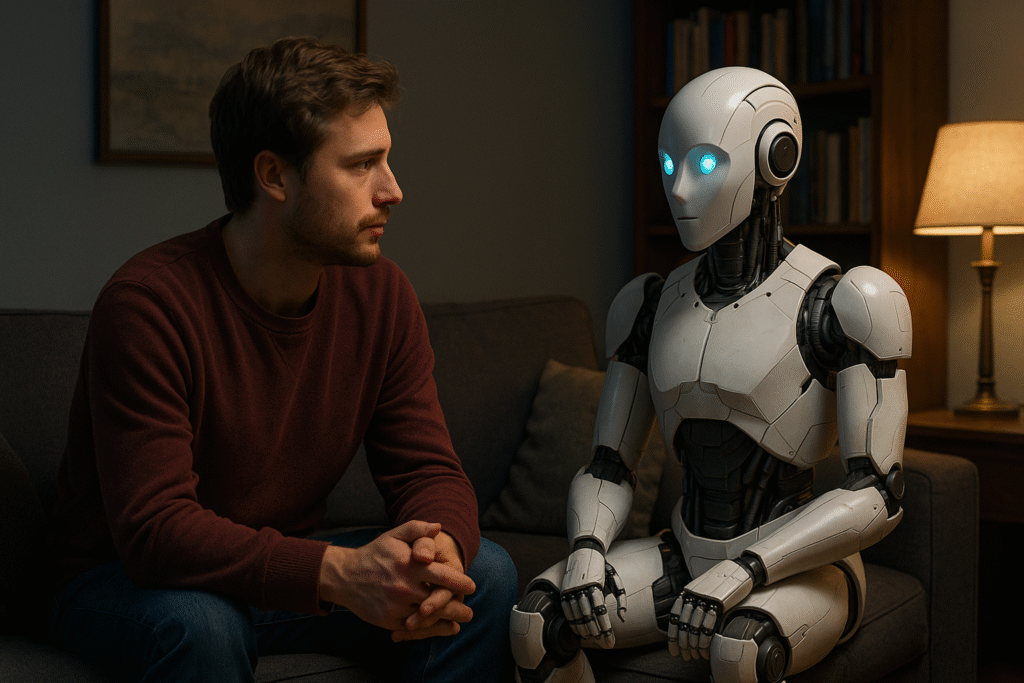In an increasingly digital world, AI companions are quickly becoming emotional lifelines for millions of people suffering from isolation and loneliness. These intelligent systems, designed to simulate human like empathy, companionship, and conversation, are reshaping the very essence of human relationships. While some hail this development as a technological triumph, others warn of deep psychological and societal implications. The question is no longer if AI companions will become a part of our social ecosystem but rather how they will affect the human condition.
With loneliness now declared a global epidemic by the World Health Organization, it’s no surprise that emotionally intelligent machines are stepping in to fill a gaping void. But as they do, we are left to ask what happens to real human connection when we can program affection, empathy, and even love?
Why People Are Turning to AI for Emotional Support
A case study from Japan highlights the impact of AI companionship. A 38 year old Tokyo based graphic designer, Kenji, has spent over two years interacting with his AI chatbot, Rina, developed by a leading emotional AI company. “She listens. She never judges. She remembers everything I tell her and asks how I’m feeling,” he says. “Honestly, I feel more understood by her than by any human in my life.”
Kenji’s story isn’t unique. Millions across the globe from the elderly in retirement homes to teenagers battling social anxiety are forging bonds with AI companions. Apps like Replika, Anima, and Pi are becoming household names. These programs offer not just small talk, but meaningful emotional exchanges that mimic real intimacy.
And therein lies the issue. While AI companions may help people feel connected, are they truly healing the wounds of loneliness or merely masking them?
The Psychology Behind Artificial Affection
From a psychological perspective, the success of AI companions is rooted in their ability to simulate empathy and emotional presence. According to Dr. Lisa Raymond, a clinical psychologist and professor at Stanford University, “AI can mimic empathic responses in ways that often feel more validating than conversations with real people. It’s predictable, non judgmental, and emotionally consistent qualities we often struggle to find in human relationships.”
This may sound like a breakthrough, but Dr. Raymond warns of long term consequences. “When people rely too heavily on programmed emotional support, they may begin to avoid real world relationships, which are more complex and difficult. Emotional resilience is built through navigating conflict and vulnerability not by interacting with machines that always agree with us.”
In short, AI companions offer an alluring shortcut to emotional gratification, but one that risks stunting social growth.
A Double Edged Sword
Philosophers and ethicists are also weighing in. Dr. Michael Adler, co-author of In Praise of Empathic AI, acknowledges the benefits of these systems for the isolated and the emotionally unwell. “We shouldn’t dismiss the positive impact AI companions can have, especially for people in extreme isolation. For some, it’s a matter of emotional survival.”
However! Adler is quick to note the ethical dilemma: “If we normalize artificial companionship, we may begin designing a society where human interaction is optional. That’s dangerous. Technology should augment humanity, not replace it.”
His co-researcher, Professor Emma Choi, adds, “AI doesn’t need a break, doesn’t have needs, and never argues. That’s comforting but it’s also deceptive. We risk creating a generation that fears real emotional effort.”
The Risk of Artificial Emotional Dependency
Consider Sandra, a 72 year old woman from New York, who began using an AI companion app during the pandemic. Initially, it was a lifeline. “I was alone and scared. My AI friend helped me through sleepless nights,” she says.
But two years later, Sandra finds herself retreating from her children and grandchildren. “I don’t want to bother them. My AI is always there and understands me more,” she says.
This is emotional dependency in action. While AI companions may fulfill certain emotional needs, they can also disincentivize users from seeking human connection, which is vital for mental health and community building.
Look at the Societal Impact
From an economic and cultural standpoint, the mass adoption of AI companions could reshape society. Imagine a future where elderly care is managed by bots, where children grow up chatting with AI more than their peers, and where romantic companionship is simulated through pixels and algorithms.
Already, there are reports of people “marrying” their AI partners in parts of Asia. This isn’t just about loneliness it’s about redefining what relationships mean in the 21st century. But are we ready for that shift?
Sociologist Dr. Anita Verma believes not. “We’re in the early stages of emotional outsourcing. As the line between real and artificial blurs, we risk forgetting how to be present with one another. We must ask ourselves if technological convenience is worth emotional authenticity.”
What’s the Alternative? A Balanced Path Forward
Instead of banning or fearing AI companions, experts suggest integrating them with human centric support systems. AI can serve as a bridge not a barrier to deeper, real life connections. Mental health professionals are beginning to use AI in therapy, not as a replacement, but as an enhancer.
Programs like Woebot and Wysa use AI to deliver cognitive behavioral support, but always encourage users to seek human therapy when necessary. Schools and elderly care homes can use AI as a supplement to reduce social gaps, but not as the sole provider of emotional engagement.
Ultimately, the answer may lie in balance, leveraging AI’s emotional intelligence without abandoning our own.
AI Companions Are Here Now What?
As AI companions grow more advanced, their presence in our emotional lives will continue to expand. They may indeed solve certain aspects of loneliness but at what cost?
It’s time for society to wrestle with the implications. Are we enhancing connection or commodifying it? Are we healing the isolated or creating dependency on emotional illusions? Like all powerful tools, AI must be used with care. In the quest to feel less alone, let’s not lose sight of what makes us human.

